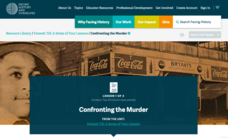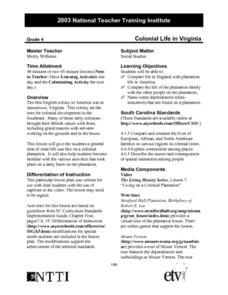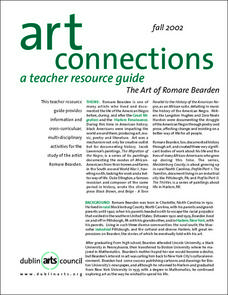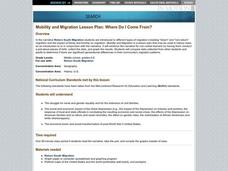Curated OER
Mediterranean Trade in the Late Bronze Age
Seventh graders analyze the amount and conditions of trade in the late Bronze Age. In groups, they research where a variety of items and goods originated. They participate in Mediterranean trade days in which they try to acquire as...
Curated OER
Land, Liberty and the Struggle for the American Dream
Students investigate equality by reading a historical fiction book in class. In this civil rights lesson, students read the story Roll of Thunder, Hear my Cry with their classmates and define the Jim Crow Laws that kept blacks...
Facing History and Ourselves
Emmett Till: Confronting the Murder
The 1955 murder of Emmett Till is often regarded as the catalyst for the Civil Rights Movement of the 20th century. Learn more about the brutal crime—and, as many believe, the miscarriage of justice—that began a national conversation...
Curated OER
Islamic Art; Exploring the Visual Arts of the Middle East
Young scholars create a monogram, based of the idea of a Turkish Tughra. They examine the connection between writing for communication and writing as an art form. They explore the vocabulary related to the use of art media in the...
Curated OER
Emotion Masks
High schoolers analyze and discuss masks of different cultures as an art form to evoke emotion. This lesson plan culminates in the creation of individual mask designs and self-directed assessment (included).
Curated OER
What Caused the Great Depression?
Analyze the many causes of major political, economic, and social developments during the 1920s and 1930s, with emphasis on the Great Depression. Read photographs from the 1920's and the 1930's, then write a brief explanation of what you...
Curated OER
Colonial Life in Virginia
Fourth graders compare and contrast life in England with plantation life in America. They study the dependencies or mini-industries that could be found on plantations.
Curated OER
Abolishing Slavery
Learners explain the goals and methods of the abolitionist movement.
They identify key leaders in the movement. This lesson has adaptations for elementary through high school. Links are provided for resource readings.
National Endowment for the Humanities
Slavery and the American Founding: The "Inconsistency Not to Be Excused"
High schoolers examine slavery in the revolutionary and colonial eras of the United States. In this slavery lesson, students investigate the presence of slavery in early America, the language of the Constitution, and the intent of the...
Curated OER
Catch the Gullah Beat: Rhythm and Percussion
Young scholars explore the Gullah culture. For this social studies lesson, students construct and play instruments similar to those of the Gullah people.
Curated OER
A Voice for the Times
Students make connections with events of the Civil Rights Movement in the 1960's with songs made popular by Aretha Franklin.
Curated OER
Uncle Tom's Cabin
Students read the novel, Uncle Tom's Cabin, and explain public attitudes towards slavery in 19th century America.
Curated OER
This Land is Your Land
Students consider the concept of borders and their development by looking at maps and documents. They create a presentation highlighting a current border dispute and propose solutions.
Curated OER
Visual Art: Romare Bearden and Group 306
Pupils examine the life and art of Romare Bearden. Using his "Mill Hand's Lunch Bucket" for inspiration, they write a first chapter for a book. Students observe numerous other works of his art and discuss them from artistic and social...
Curated OER
The Trading Post with the Most: Colonial Dorchester's Settlement and Economy
Eighth graders explore the Dorchester settlement, In this American colonial history lesson, 8th graders examine primary resources and maps from the Dorchester trading post in order to learn about its contributions to the Revolutionary War.
Curated OER
Antisemitism in Early America
Eleventh graders explore the rise of antisemitism in the United States in the early 20th century. After reading a passage concerning one man's ordeal, 11th graders discuss how the civil rights of minority groups has been viewed in...
Curated OER
WHERE DO I COME FROM?
Students analyze the struggle for racial and gender equality and for the extension of civil liberties, the social and economic impact of the Great Depression, and the economic boom and social transformation of post-World War II United...
Curated OER
A Bird's Eye View of the Caribbean: Art, Folklore, and Music
Students examine the Caribbean in terms of its music, art, and folklore. As a class, they listen to a folktale and discuss the difference between telling a story and reading a story. In groups, they write their own folktale and share...
Curated OER
Rice Around the World
Third graders draw pictures to show the life of early colonists and how they set the standard for rice farming. In this rice farming lesson plan, 3rd graders read about how and when Americans set the standards for growing and producing...
Curated OER
Angelina and Sarah Grimke: Sisters of Social Reform
Students read about Angelina and Sarah Grimke and answer comprehension questions about them. In this women of social reform lesson plan, students read about women who helped to abolish slavery, discuss having goals and ambitions, and...
Curated OER
Working Watermelon
You're going to wish you had a watermelon for this activity! Class members read about watermelons and make a salad in class to sample. They also perform estimates, measurements and calculations on a watermelon. They predict what...
Curated OER
Prairie Voices: Where People Come From
Students examine the human experience. In this migration lesson, students determine reasons for migration, discover the traits of cultural groups, and explore how groups of people come to share their experiences despite language,...
Small Planet Communications
Civil War
Learners discuss political, social, and personal issues relating to the Civil War from various perspectives using internet sources. Students write various selections from Civil War characters' point of view.
Curated OER
Basic Animal Behavior in Domesticated Animals
Learners investigate animal behavior, examining the nervous system and the physiology of the brain and the fight or flight response. They simulate animal behaviors and discuss the difference between an instinct and a behavior.

























